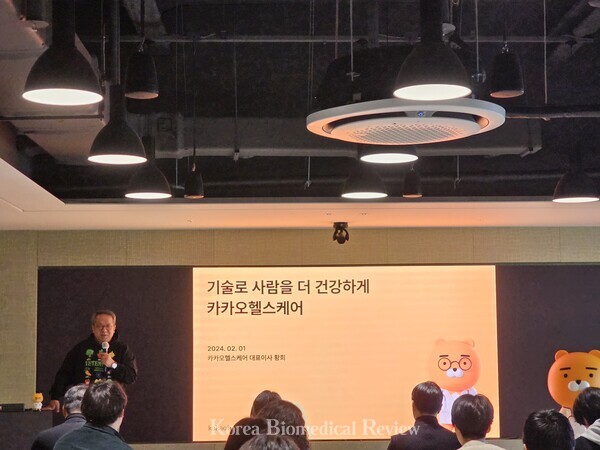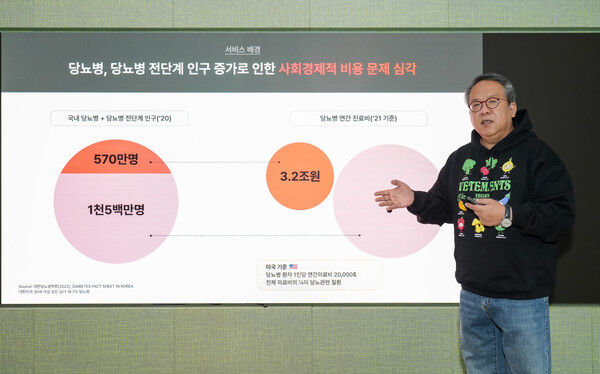In a significant move towards advancing digital healthcare, Kakao Healthcare, led by CEO Hwang Hee, unveiled its first service, "PASTA," an AI-based mobile blood glucose management application, on Thursday in Korea.

The service was officially announced during a press conference held at Kakao Pangyo Agit in Seongnam, Gyeonggi Province, marking a major milestone for the company, which aims to make a significant impact on the lives of diabetes patients by offering personalized care and reducing the socio-economic costs associated with the disease.
"PASTA stands for Personalized, Accessible, Supportive, Tech-enabled, Affordable," Hwang said. "The app facilitates seamless integration with continuous glucose monitoring (CGM) devices, like i-Sens's CareSens Air and Dexcom's G7, allowing users to monitor their blood glucose levels in real-time without the need for separate registration, using their Kakao accounts."
This feature is designed to help users understand the correlation between lifestyle habits and blood glucose levels, thus enabling better management of the condition, Hwang added.
During the press conference, Hwang emphasized the potential of PASTA to alleviate the burden on healthcare systems.
"Diabetes patients can significantly reduce their medication needs by altering their dietary and exercise habits alone," he said. "With PASTA, we aim to offer a different approach to treatment under the standard diabetes care guidelines."
He further highlighted the service's contribution towards reducing the annual treatment costs, which currently stand at around 3 trillion won ($2.2 billion) for the six million diabetes patients in Korea.
The PASTA application also offers a suite of features, including real-time blood glucose data analysis, lifestyle habit inputs (like diet and exercise), and personalized activity recommendations.
"Real-time data reception is what sets us apart from existing lifestyle management apps," Hwang said. "Moreover, PASTA provides detailed reports analyzing various metrics such as glucose variability, glucose management indicator (GMI), the percentage within the target range, average glucose levels, and highlights of blood glucose readings."
The app also features community boards for users to share experiences and support each other, alongside a professional dashboard, "PASTA Connect Pro," designed to help doctors monitor their patients' glucose information and utilize it in clinical decisions, he added.
Looking ahead, Hwang stressed that Kakao Healthcare plans to extend PASTA's capabilities by integrating it with insulin pens, such as the "Mallya Smart Cap" by Novo Nordisk and Biocorp, through an SDK (Software Development Kit) approach, in a world-first initiative expected to be completed by the second quarter of the year.
The smart cap uses a Mallya smart sensor, which is attached directly to insulin pen injectors to make them connected devices. It automatically collects and records key treatment information and then transmits the information to a dedicated digital application.
"This expansion underscores the company's ambition to not only manage diabetes more effectively but also to address other chronic conditions directly related to the disease," he said.
Hwang also unveiled his plans to take PASTA to the global stage, starting with Japan, as part of its broader strategy to extend its services to chronic diseases associated with diabetes.
"Through partnerships with global entities, the company aims to enter new markets, including the U.S. and the Middle East, within the year," he said.
'Integrating Kakao Healthcare's PASTA with artificial pancreas systems unlikely'

Hwang also addressed an inquiry from Korea Biomedical Review regarding the potential future integration of PASTA with artificial pancreas systems (APS), which would complete the full cycle of diabetes management solutions.
He acknowledged the validity of incorporating APS into the diabetes management cycle.
He noted the technical feasibility of such integration, emphasizing that while Kakao Healthcare is capable of implementing APS, considerations around regulation, patient safety, and the appropriateness of a software company like Kakao managing insulin adjustments through algorithms remain cautious topics.
"From my perspective, APS should operate under medical supervision rather than solely under a software company's purview," he said. "I am somewhat skeptical about Kakao Healthcare directly handling insulin pump injections, citing the need for a level of technological, regulatory, and safety assurance comparable to companies like Medtronic, which leads in APS technology."
However, Hwang remains open to the idea of PASTA playing a role within a broader ecosystem that includes APS, provided that such integrations are managed by hospitals or related healthcare entities.
"Kakao Healthcare could offer APS support to facilitate this, which means a collaborative approach to achieving a full-cycle diabetes management solution without directly engaging in the complexities of insulin pump management is still possible," he said.
Related articles
- [JPM 2024] Kakao Healthcare aims to go global with diabetes management, clinical data analysis
- Huons, Kakao Healthcare to co-market Dexcom's continuous glucose monitoring device
- Kakao Healthcare partners with C&R Research to conduct global clinical trials
- Huons launches continuous glucose monitor Dexcom G7
- Korean, foreign health regulatory officials visit Kakao
- Obesity experts warn against using CGM for weight loss in non-diabetics
- Kakao Healthcare and Brave Company team up to spread blood sugar management content
- Kakao Healthcare participates in Google Cloud Next 2024 Conference
- Kakao Healthcare and OURHOME to research and develop AI-based hyper- personalized healthcare solutions

